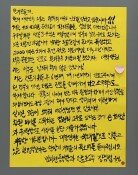Algorithm power to dominate the world with YouTube replacing news media
Algorithm power to dominate the world with YouTube replacing news media
Posted August. 16, 2019 07:38,
Updated August. 16, 2019 07:38
“YouTube is something that looks like reality, but it is distorted to make you spend more time online. It is designed to use stimulating content to draw people’s attention and to increase advertising revenues,” revealed a former YouTube engineer who was in charge of the video-sharing website’s algorithm.
He conducted an interesting experiment with British newspaper The Guardian. They looked into YouTube’s recommendation system regarding then-U.S. presidential candidates Donald Trump and Hillary Clinton. The analysis of top 1,000 videos recommended as a result of alternatively searching the two candidates’ names found that about two-thirds of the recommended videos were favorable to one particular candidate or overly biased.
YouTube, which used to play the roles of showing the content uncovered by the established media or entertain users with interesting videos, is now entering the field of news media. The mechanism that allows the website to have an impact on political and social issues beyond providing fun and informational content is its recommendation function to automatically play another related video right after one video ends. However, is the recommendation algorithm based on the analysis of users’ viewing patterns designed with no bias?
According to the experiment carried out by the American Institute for Behavioral Research and Technology, about 20 percent of swing voters can be manipulated to change their original picks of candidates by algorithm design. That’s exactly what happened in Brazil. The New York Times investigated how YouTube has driven the South American country to radicalism by reporting the process of how a populist politician who promotes racism and hate used his YouTube channel with one million subscribers to win the hearts of voters suffering from economic crisis and crimes and eventually got elected as the country’s president last year. The Berkman Klein Center for Internet & Society at Harvard University in the U.S. said political or entertainment videos with a neutral tone on YouTube’s Brazilian site are simply clickbait videos, which soon lead to videos full of hate, discrimination, and conspiracy.
Users must adopt a critical eye to determine whether the videos they are watching contain misinformation, fabricated details, or malicious intents. To this end, they must demand the responsibility of a platform, such as verification of whether or not the auto-play and recommendation list algorithm is impartially operated. The last presidential election in South Korea was tarnished with the so-called “Druking” case, an online opinion rigging scandal. It is hard to imagine what more would happen in future elections with the growing power of videos.
You-Young Kim abc@donga.com
Headline News
- Med professors announce intention to leave hospitals starting Thursday
- Bridge honoring Sgt. Moon Jae-sik unveiled in Pennsylvania
- Chief of Staff Chung tells presidential secretaries to stay away from politics
- US FTC bans noncompete agreements
- N. Korea launches cyberattacks on S. Korea's defense companies







